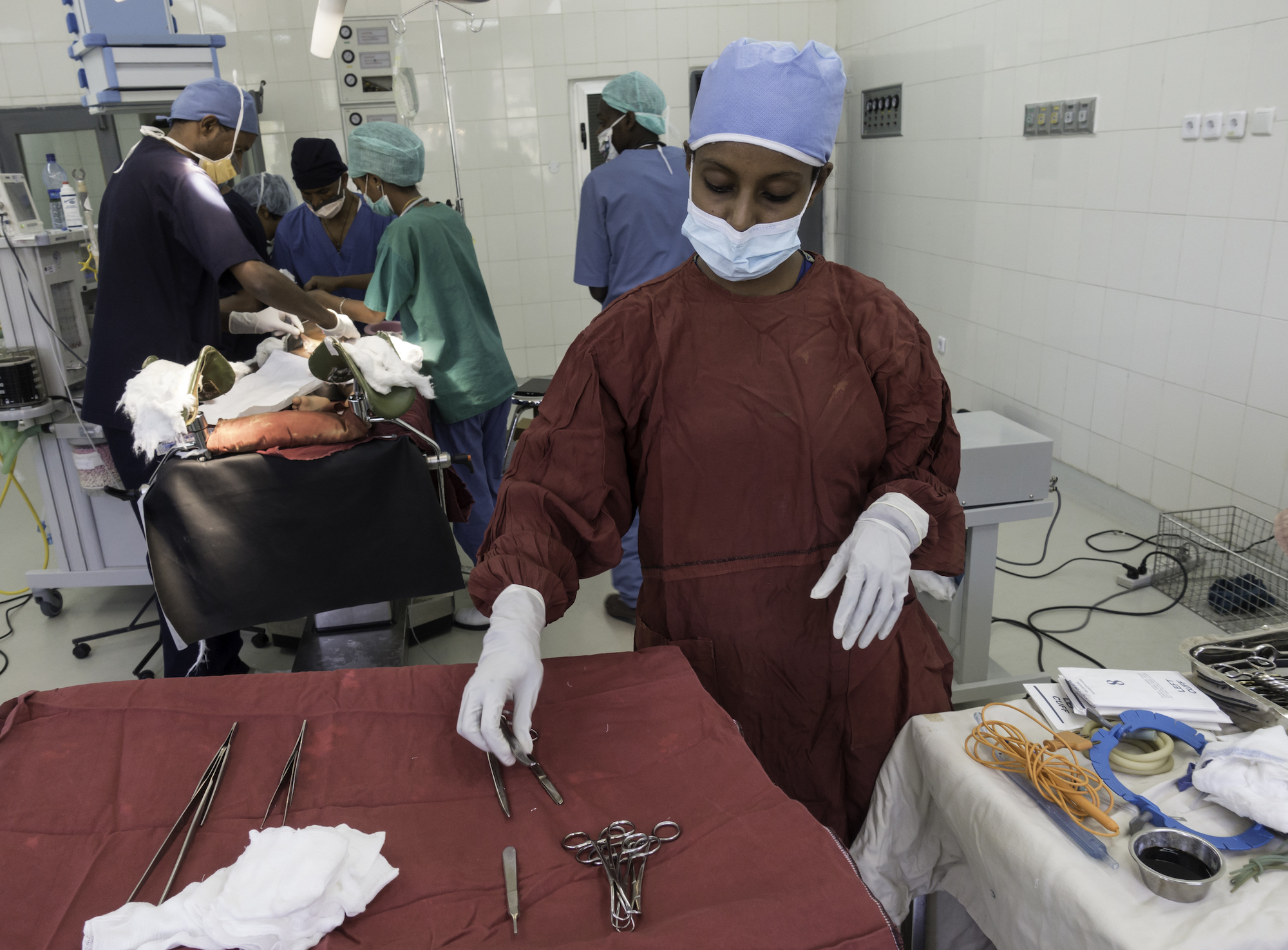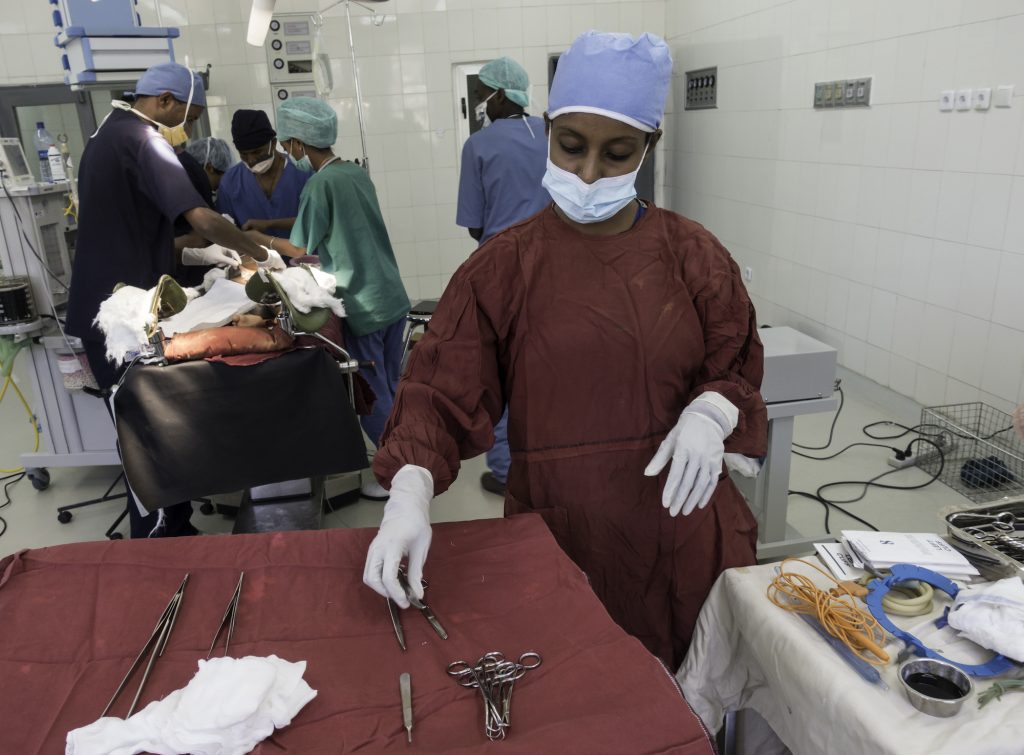The study – Operating room efficiency in a low resource setting: a pilot study from a large tertiary referral center in Ethiopia – observed a total of 933 elective procedures. Operation start time was delayed in 93.4% of cases and the cancellation rate was 36% – with the most common reasons for cancellation related to lack of OR time and patient preparation (8.7% and 7.7% respectively).

New publication – Operating room efficiency in a low-resource setting
A new study outlines operating room efficiency in a teaching hospital in Ethiopia finding high rates of cancellation and delays but that these were not caused by a lack of resources or infrastructure.
A new publication in Patient Safety in Surgery carried out by McCaskey Fellows in Ethiopia outlines the findings of operating room (OR) efficiency study in Tikur Anbessa Hospital – Ethiopia’s largest and main teaching hospital.
“We found our operating rooms are poorly utilized. This leads to wastage and drains resources which are very valuable in low-income countries with a high unmet need for surgery,"Dr. Samuel Negash, pediatric surgical resident, Lifebox Fellow, and lead author.
"In contrast to the belief that inefficiency in operating rooms of low-income countries is related to lack of infrastructure and human resources, this study found operating rooms inefficiency was attributed to delayed start times, short working days and inadequate patient preparation,”Dr. Tihitena Negussie, pediatric surgeon, Lifebox Global Clinical Director, and study author.

Operating Room at Tikur Anbessa Hospital, Addis Ababa, Ethiopia
A new study outlines operating room efficiency in a teaching hospital in Ethiopia finding high rates of cancellation and delays but that these were not caused by a lack of resources or infrastructure.
The OR is one of the most expensive areas of a hospital, requiring large capital and recurring investments. On top of increasing costs, inefficient OR utilization results in prolonged waiting lists, high rate of cancellation, frustration of OR personnel as well as increased anxiety that negatively impacts the health of patients. This problem is magnified in low-income countries, where there is a high unmet surgical need.
"This study highlights the importance of data to drive improvement, and coming to the table with concrete solutions to specific, well-identified problems. It is especially powerful as it was conducted by clinicians in their own workplace in order to improve their own working environment,”
Dr. Thomas Weiser, MD, MPH, Lifebox Consulting Medical Officer.
There is not currently a system to assess operating room utilization in Ethiopia yet this study shows that OR efficiency can be improved without additional investment in infrastructure. This research was conducted as part of the McCaskey Lifebox Safe Surgery Fellowship – a mentorship program to support the professional development of clinical leaders in Ethiopia.
Study authors: Samuel Negash, Endale Anberber, Blen Ayele, Zeweter Ashebir, Ananya Abate, Senait Bitew, Miliard Derbew, Thomas Weiser, Nichole Starr, and Tihitena Negussie. Published January, 2022, in Patient Safety in Surgery.
The OR is one of the most expensive areas of a hospital, requiring large capital and recurring investments. On top of increasing costs, inefficient OR utilization results in prolonged waiting lists, high rate of cancellation, frustration of OR personnel as well as increased anxiety that negatively impacts the health of patients. This problem is magnified in low-income countries, where there is a high unmet surgical need.
"This study highlights the importance of data to drive improvement, and coming to the table with concrete solutions to specific, well-identified problems. It is especially powerful as it was conducted by clinicians in their own workplace in order to improve their own working environment,”Dr. Thomas Weiser, MD, MPH, Lifebox Consulting Medical Officer.
There is not currently a system to assess operating room utilization in Ethiopia yet this study shows that OR efficiency can be improved without additional investment in infrastructure. This research was conducted as part of the McCaskey Lifebox Safe Surgery Fellowship – a mentorship program to support the professional development of clinical leaders in Ethiopia.
Study authors: Samuel Negash, Endale Anberber, Blen Ayele, Zeweter Ashebir, Ananya Abate, Senait Bitew, Miliard Derbew, Thomas Weiser, Nichole Starr, and Tihitena Negussie. Published January, 2022, in Patient Safety in Surgery.

